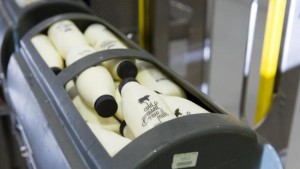The New South Wales Food Authority has defended its decision to approve the sale of an unpasteurised milk product, saying the company involved was subject to a two year, rigorous approval process.
 It is being marketed as “cold pressed raw milk” and leading experts have expressed concern about a lack of research proving the cold pressure process was as effective as traditional pasteurisation.
It is being marketed as “cold pressed raw milk” and leading experts have expressed concern about a lack of research proving the cold pressure process was as effective as traditional pasteurisation.
But CEO of the New South Wales Food Authority Dr Lisa Szabo said the product had been approved only after two years of rigorous consultation.
“We asked them ‘well what are the hazards that they’re trying to control in the milk’, and this company had a really strong and comprehensive list of the microbiological hazards that they wanted to control,” Dr Szabo said.
Dr Szabo worked as a research scientist with the CSIRO and said “for five years of my time there I spent doing research on high pressure, and in particular its effect on micro-organisms.
“So I have a great deal of confidence that this particular processing technology can inactivate micro-organisms.”
High pressure processing has been used for other products for a long time and Dr Nidhi Bansal from the University of Queensland’s School of Agriculture and Food Sciences said it has been quite successful.
“Obviously it hasn’t been commercialised for milk yet. So there could be some concern about it, but as long as the company can prove that it is microbiologically safe then I don’t see an issue with that,” Dr Bansal said.
Saxon Joye, the owner of the company approved to sell unpasteurised milk and said his product was not quite “raw milk,” it had just not gone through the traditional pasteurisation process, where milk is exposed to high temperatures.
“We take our raw milk, and we put it under our cold pressure. If there’s any harmful pathogens or bacteria, we remove it during that process,” he said.
“Good herd management, hygienic milking techniques and the cold pressure method have meant we can put 100 per cent safe, raw milk onto supermarket shelves,” said Mr Joye.
“The bottles of milk are placed under enormous water pressure, squashed in about 15 per cent, to remove the harmful micro-organisms.”
Professor Peter Collignon, a leading infectious disease physician and microbiologist, said he was concerned about the lack of research showing the efficacy of cold pressure.
“I do worry this is a marketing exercise for raw milk but without the science to show the process is anywhere near as good as pasteurisation,” he said.
“The [data and research] that shows [cold-pressure is just as good as pasteurisation] needs to be robust and available for all to see, including the public, and needs independent verification.”
The Food Authority’s spokeswoman did not directly answer questions about releasing data to support its decision to approve the new method.
